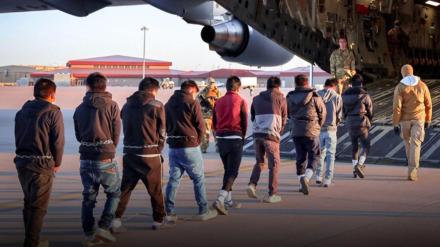By: Staff Writer
April 14, Colombo (LNW): In a major shift in US immigration policy, the White House has announced a sweeping new rule requiring all foreign nationals including Sri Lankans residing in the United States for more than 30 days to register with the federal government—or face severe penalties.
This includes undocumented immigrants, visa holders (such as H-1B and F-1), legal permanent residents, and even recent arrivals without valid documentation.
In 2025, the number of Sri Lankans residing illegally in the US and the number residing for more than 30 days without registration are not explicitly specified in the provided search results. However, the search results indicate that 3,065 Sri Lankans are among over 1.4 million noncitizens with final deportation orders as of November 24, 2024.
It’s important to note that this number represents those with final orders of removal, not necessarily the total number of illegal residents.
The search results also mention that the US government has requested foreign governments to assist in confirming the citizenship of non-citizens and taking appropriate steps for their return.
Who’s impacted from the new rules?
Effective April 11, 2025, the regulation mandates that all non-citizens aged 18 and older must carry proof of registration at all times. Those entering the US after this date must register within 30 days of arrival. Children turning 14 must also re-register and submit fingerprints, regardless of any prior status.
“All foreign nationals present in the United States longer than 30 days must register with the federal government. Failure to comply with this is a crime punishable by fines, imprisonment, or both,” White House Press Secretary Karoline Leavitt said in a statement.
“If not, you will be arrested, fined, deported, never to return to our country again,” she added.She also mentioned that the deadline to register under the Alien Registration Act was on April 11 (local time).
The directive, rooted in the decades-old Alien Registration Act from World War II, was given the green light after a ruling from US District Judge Trevor N. McFadden, a Trump appointee, who dismissed a legal challenge by advocacy groups.
The judge ruled that the plaintiffs lacked sufficient legal standing to block the rule’s enforcement, clearing the way for the controversial regulation to take effect.
The Department of Homeland Security (DHS) clarified that individuals entering the US after April 11 are required to register within 30 days. Children turning 14 must also re-register and provide fingerprints, regardless of any prior registration status.
Leavitt, who also serves as assistant to President Donald Trump, emphasised that this measure was about national security and law enforcement.
The penalties for non-compliance include a fine of up to $5,000 or imprisonment for up to 30 days, in addition to deportation proceedings and a permanent ban from re-entering the country.
The move has triggered widespread concern, particularly among undocumented immigrants, temporary visa holders, and mixed-status families, many of whom fear the new policy could lead to sweeping enforcement actions and heightened scrutiny.

